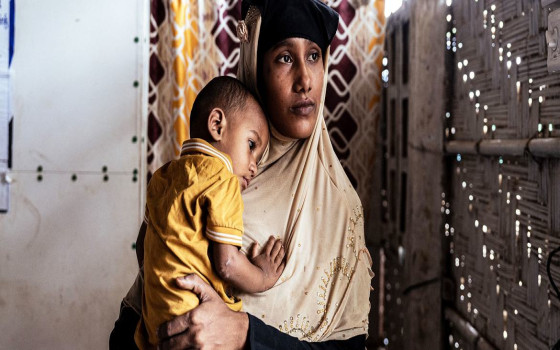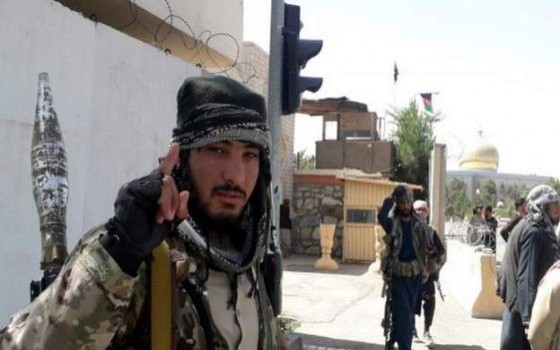
Calls for a sustainable political solution to the Rohingya Muslim crisis – “A long history of persecution”… During a high-level conference on the sidelines of the UN General Assembly

- Europe and Arabs
- Wednesday , 1 October 2025 9:45 AM GMT
New York: Europe and the Arabs
UN Secretary-General António Guterres called for collective action to resolve the crisis affecting the Rohingya Muslims and other minorities in Myanmar, stressing the need for a sustainable political solution that would shape a peaceful and inclusive future for all people in Myanmar.
The Secretary-General made this call at a high-level conference on the situation of the Rohingya Muslims and other minorities in Myanmar, held on the sidelines of the 80th session of the UN General Assembly.
In remarks delivered on his behalf by his Chief of Staff, Erna Courtney Rattray, Guterres said that this crisis, which has worsened since the 2021 military coup, "violates the human rights, dignity, and safety of millions and threatens regional stability."
The Rohingya minority has long been denied citizenship and basic rights in Myanmar. More than 750,000 of them fled waves of violence that peaked in 2017. They poured into Bangladesh, where they found temporary shelter in what is now the world's largest refugee camp in Cox's Bazar.
Three Demands
The Secretary-General, through his Chief of Staff, noted that "the Rohingya have been targeted with hate speech and terrorized with lethal force and destruction."
He referred to his visit to Cox's Bazar last Ramadan, where he met with Rohingya refugees who expressed their desire to return home, but conditions in Rakhine State in Myanmar prevent their safe, voluntary, dignified, and sustainable return. Guterres made three key demands to those present, including the need for all parties to respect international humanitarian law and human rights law, and for the protection of civilians to be an urgent priority.
He also called for ensuring unimpeded access to humanitarian aid in Myanmar, as well as increased humanitarian and development investment to meet basic needs, help refugees become self-reliant, and alleviate the burden on host communities.
A preventable crisis
The President of the UN General Assembly, Annalena Baerbock, began her address at the conference by speaking about the suffering endured by millions of Rohingya people over the past eight years.
She described the situation in the Cox's Bazar camp as "desperate" and warned about the impact of drastic cuts in funding, noting that some 1.1 million survivors of gender-based violence "are left without basic support."
"This should make us ashamed. This suffering is entirely preventable," she said. She emphasized that the Rohingya people need the support of the international community, not just in words, but in deeds.
Baerbock said the Rohingya have shown remarkable resilience during eight years of hardship, displacement, and uncertainty, and called for a response commensurate with this extraordinary resilience.
Funding will save lives
For his part, UN High Commissioner for Refugees Filippo Grandi expressed his renewed gratitude to the countries in the region—led by Bangladesh—that have hosted refugees from Myanmar, especially Rohingya refugees, for so many years. But he warned that host countries cannot shoulder this responsibility alone, noting that the humanitarian response in Bangladesh continues to face a chronic funding gap, including in key areas such as food and cooking fuel.
“We must do more, please. I appeal to all of you. Funding will save lives – there is no doubt about that,” he said.
He called for “greater unity, coherence and determination” to achieve some key objectives, such as re-establishing a humanitarian presence in northern Rakhine and ensuring humanitarian access in future return areas, resuming trust-building measures initiated by UNHCR and UNDP years ago, and insisting that those in control of the camps – which still house internally displaced people – address their plight and seriously pursue fair and lasting solutions.
Another grim chapter
The UN High Commissioner for Human Rights, Volker Türk, said this conference must send a clear signal that “this injustice is at the top of the global political agenda. It must be a turning point for the Rohingya, for the international community to act and find a lasting solution to their plight.”
He noted that since November 2023, fighting has escalated in Rakhine, where Rohingya are targeted from all sides, and life has become worse than ever for Rohingya and other minorities, “marking another grim chapter in a long history of persecution.”
He also pointed out that the humanitarian situation continues to deteriorate in Rakhine State and across the country, with military blockades severely hampering humanitarian access. He added that nearly a third of the country’s population – some 15.2 million people – are facing acute food insecurity this year. Turk stated that these circumstances have led to the displacement of more than 3.5 million people within Myanmar, and have forced an additional 150,000 Rohingya to flee to Bangladesh since January 2024. The UN official called for an end to the violence in Myanmar, for sustained financial support to all communities there and to the Rohingya in Bangladesh, for countries to provide protection to those fleeing the conflict, and for Myanmar to respect the interim measures imposed by the International Court of Justice to protect the lives of the Rohingya and to heed their calls for peace and freedom. Civil society calls for action: These calls were echoed by a group of civil society representatives who spoke at the conference, including Wai Wai Nu, the founder and executive director of the Women's Peace Network, who urged the international community to intervene immediately "to fulfill its responsibility to protect the remaining Rohingya." She emphasized the need to impose targeted sanctions on perpetrators of mass atrocities to limit their ability to terrorize more civilians, and to send an independent fact-finding mission to Rakhine State to monitor the situation and gather evidence of atrocities.
She added, "Without action, the Rohingya displacement will continue until there are no Rohingya left in Myanmar."
Addressing the member states, she said, "You have the evidence and the capacity to act. What we lack is political will."
Rafiq Hassan, founder of the Arakan Youth Network for Peace, said that the deepest wish of the Rohingya people is to live peacefully and safely with diverse communities in their homeland, adding, "But the past decade has shown that this is impossible for us without international support."
Hassan said, "The systematic genocide against the Rohingya has not only affected my life, but also my unwavering commitment to justice and my determination to advocate for my people and other marginalized communities."
He called on all UN member states to establish a UN-supervised safe zone in northern Rakhine State, with the support of ASEAN and other regional stakeholders, to ensure the protection of all civilians, and to facilitate humanitarian corridors from the Bangladeshi government to ensure the continued delivery of life-saving aid.
"Time is not on our side."
Julie Bishop, the UN Secretary-General's Special Envoy to Myanmar, spoke about her efforts there, where she listens to conflicting viewpoints, while remaining neutral and upholding UN values and principles, in order to help support and promote a sustainable, inclusive, and peaceful, Myanmar-led political solution.
She warned that "a zero-sum mentality still prevails in this highly polarized country."
She noted that Myanmar's National Security Council, which replaced the State Administration Council after the end of the state of emergency on July 31, intends to hold elections. She stated: "There is a real risk that the elections scheduled for December, under current circumstances, will only fuel further resistance, protests, and violence, and undermine the already fragile situation in the country." She warned that civilians have been caught in the "crossfire of a complex conflict" involving the Myanmar military, the Arakan Army, and other armed groups, with some civilians, including children, subjected to forced recruitment and other abuses. She said that in her contacts with all parties, she emphasized their responsibility to allow unhindered access for humanitarian aid. She also continued to call for an end to airstrikes targeting civilian infrastructure. Bishop concluded: "We have not yet found common ground or a willingness to compromise that would bring all parties to the negotiating table. Time is not on our side."












No Comments Found